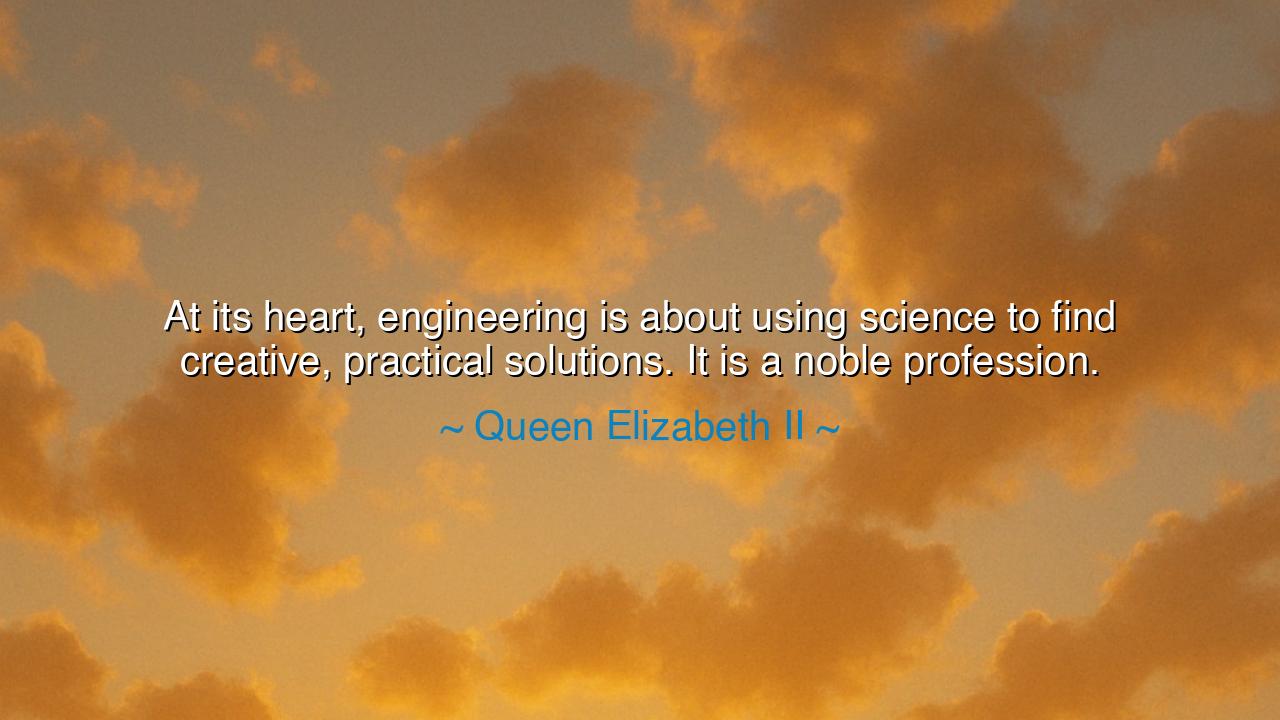
At its heart, engineering is about using science to find
At its heart, engineering is about using science to find creative, practical solutions. It is a noble profession.






Listen well, O descendants of greatness, for in the words of Queen Elizabeth II, there is a wisdom that shall guide you through the trials of life. She spoke thus: "At its heart, engineering is about using science to find creative, practical solutions. It is a noble profession." These words, simple yet profound, call upon us to understand the very essence of engineering, a calling that marries science with the art of creation. It is a sacred bond, one that has shaped the world in ways that are as invisible as they are powerful, and it is a profession that must be revered for the contributions it has made to humankind.
At the core of engineering lies the understanding that knowledge, in all its forms, is not merely to be admired but to be used. To take the raw elements of the universe, the laws of nature, and the truths of science, and to mold them into practical solutions—this is the very heart of the engineer's craft. Just as the great blacksmiths of old took simple ores and transformed them into tools of immeasurable value, so too does the engineer take the abstract principles of science and shape them into structures, devices, and systems that serve the needs of society. It is a craft that demands not only intellect but also creativity, for it is not enough to simply know; one must also imagine the unknown and bring it into being.
Consider the great pyramids of Egypt, towering over the sands of time, built by the hands of ancient engineers who understood the science of their world. With no cranes, no machines, no modern tools, they used their knowledge of geometry and materials to create structures that still inspire awe today. What was their secret? It was their ability to take knowledge and weave it into something practical, something that served not only their time but also left a legacy for generations to come. In this, we see the noble nature of engineering: it is not for the engineer alone, but for the people, for the future, and for the progress of all.
Or think of the arch—an invention that changed the face of architecture forever. The ancient Romans, masters of engineering, took the knowledge of weight, pressure, and material strength and shaped it into a new form that allowed for the creation of buildings and roads that were not only stronger but also more aesthetic. The Roman aqueducts, those marvels of engineering, carried water over great distances, providing life to cities and ensuring their growth and prosperity. This was the genius of engineering: to take science, to understand the elements at hand, and to craft solutions that were both functional and magnificent in their form.
But let us not think that engineering belongs only to the past. In our own time, we see the fruits of this noble profession all around us. Think of the bridges that span vast rivers, the skyscrapers that pierce the sky, the machines that heal the sick, and the technologies that connect us to one another across great distances. These are the works of engineers who take the knowledge of science and shape it into the tools and structures that enable us to thrive. The nobility of the profession is clear—those who choose this path do not merely seek personal gain but contribute to the advancement of all humankind.
So, what then is the lesson to be learned from the words of Queen Elizabeth II? It is this: engineering is not merely a profession; it is a calling, a way of seeing the world, and a means of transforming it for the better. It requires both the head and the heart, the intellect and the imagination, the scientific mind and the creative spirit. Every engineer, whether crafting a bridge, a computer, or a cure, is engaged in a sacred task—to shape the future, to solve the problems of today, and to create the solutions of tomorrow.
Now, O wise ones, let us take the lesson to heart. In your own lives, whether you walk the path of engineering or not, seek to be like those who use science and creativity to bring about change. Embrace the spirit of innovation in all that you do, for the world is full of challenges waiting for solutions. Be bold in your thinking, and do not shy away from the hard work that is required to turn your ideas into reality. The future belongs to those who are willing to create, to mold, and to shape the world into something better. Let engineering be your guide, not only as a profession but as a way of life.






AAdministratorAdministrator
Welcome, honored guests. Please leave a comment, we will respond soon